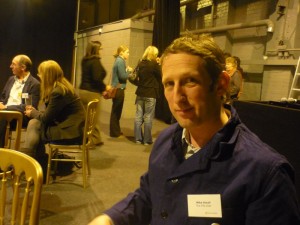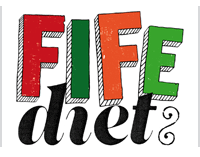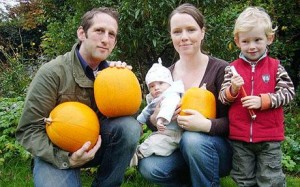23 Feb 2010
An Interview with Mike Small of the Fife Diet
 At the recent Soil Association conference in Birmingham a couple of weeks ago I cornered Mike Small of the Fife Diet and asked him a few questions about what is happening in Fife. Their work has huge implications for Transition, as well as offering some fascinating insights into the practicalities of the relocalisation of the food system. I started by asking Mike how the Fife Diet got started.
At the recent Soil Association conference in Birmingham a couple of weeks ago I cornered Mike Small of the Fife Diet and asked him a few questions about what is happening in Fife. Their work has huge implications for Transition, as well as offering some fascinating insights into the practicalities of the relocalisation of the food system. I started by asking Mike how the Fife Diet got started.
“So we launched at the Big Tent Festival. It was a rainy day and we got people together in a tent talking about local food. I suggested this and people thought it was a good idea. So we tried to do it for a year, almost a hundred per cent. So for example, we allowed ourselves to drink coffee, but other than that all our food was sourced from Fife.
And so we did that and at the end of the year it had grown and it had attracted a bit of publicity and we’d all enjoyed it so much that we decided to develop this project further, so we sought some funding.
In that first year how many people were successful in the challenge?
All of the original 14 people, but it grew to a couple of hundred buy the end of the first year and we now have about 650 registered members.
What were the challenges you encountered?
 Well, funnily enough it wasn’t sourcing the food – that was relatively easy to do. Fife’s been blessed with good arable land and access to some seafood and quite good meat, though not very good dairy. The challenge was our time and preparing unprocessed food from scratch. So one of the things the project revealed was that we’re all time-poor, over stressed and over worked. I think it was kind of a revelation to us that this isn’t about getting local food – which is relatively easily done, this is about our society which has developed so that we’re latched to mortgages that we can’t afford, so we’ve all got to work too much and then we need convenience food.
Well, funnily enough it wasn’t sourcing the food – that was relatively easy to do. Fife’s been blessed with good arable land and access to some seafood and quite good meat, though not very good dairy. The challenge was our time and preparing unprocessed food from scratch. So one of the things the project revealed was that we’re all time-poor, over stressed and over worked. I think it was kind of a revelation to us that this isn’t about getting local food – which is relatively easily done, this is about our society which has developed so that we’re latched to mortgages that we can’t afford, so we’ve all got to work too much and then we need convenience food.
Did you come up with some strategies to tackle that, because it’s a universal problem isn’t it?
Well, we did things like batch cooking, big soups, big casseroles, cook once eat twice. Some easy quick foods like omelettes – quite healthy, high energy. But I suppose we did need quite a lot more time for cooking.
Did you do things like produce recipe sheets and meal ideas and that kind of thing?
Yes, our website shares that kind of information with people. Each month there’s a monthly seasonal recipe sheet. A lot of that is teaching people how to cook seasonal food.
The people who got involved with this, had they been into it for a while? What’s the breadth and depth of engagement?
I think it’s really diverse. We’ve worked quite hard to not just operate within “green circles”. We went to Lathan Co-operative Women’s Guild, which is the biggest one in Scotland. 197 women on a Monday night, sitting around with a cup of tea, hearing about the Fife diet and sharing their recipes with us, which is a brilliant example of inter-generational exchange.
What next? Where do you see this going?
 I think we want to work with the idea that this isn’t just about self-sufficiency. Reaching out to the poorest, we want international solidarity for developing this idea of 80-20: eating 80 percent locally sourced and 20 per cent Fair Trade. We’ve made booklets of our memoirs to incentivise people. We’re also working on this idea of it’s not self sufficiency – it’s sufficiency. It’s knowing that we’ve got enough, because what we’ve realised is that in a supermarket you’ve got 55,000 different items to choose, but nutritionally what’s available locally is enough. It’s recalibrating people to not gorge themselves on stuff, making them realise that what’s in season is largely enough for their needs.
I think we want to work with the idea that this isn’t just about self-sufficiency. Reaching out to the poorest, we want international solidarity for developing this idea of 80-20: eating 80 percent locally sourced and 20 per cent Fair Trade. We’ve made booklets of our memoirs to incentivise people. We’re also working on this idea of it’s not self sufficiency – it’s sufficiency. It’s knowing that we’ve got enough, because what we’ve realised is that in a supermarket you’ve got 55,000 different items to choose, but nutritionally what’s available locally is enough. It’s recalibrating people to not gorge themselves on stuff, making them realise that what’s in season is largely enough for their needs.
What was the thinking behind 80-20% (local/imported)?
It was about saying we didn’t want the eat local movement to be a parochial retreat inwards because we believe that eating locally is an act of solidarity with the developing world in terms of climate change and climate justice. We wanted to show solidarity by buying stuff that we just couldn’t get here. We also wanted tactically to say to people “look this isn’t too scary – you can do this!” Of course people say they couldn’t give up things like bananas or chocolate or red wine. 80-20 make it seem less scary, so that’s the thinking behind it.
Has it led t some tangible re-connections between people in the town and farmland surrounding?
Definitely our producers now support us and we support them, so I think it’s about reclaiming your food culture and also we do something called community assisted lunches where we come together in village halls and feed the community with free lunches. People come and cook with us and it’s hosted by that community. We figured that the key to making these events work was to have crèche facilities, because suddenly things shifted from men talking abstract about climate change, to women and mums.
Has it always been purely driven by volunteers or do you have some paid staff?
No, we have the Climate Challenge Fund and we heard yesterday that the new budget has nine million to continue.
In terms of the wider re localisation process, and the food share idea, what are your thoughts about what that will look like in practise? If you woke up in ten years’ what would that look like?
I think there’s some key development issues there. We’re just about to get oats and flour available locally – both organic from Fife, so binging some staples into our local diet really will shift things. If we can make bread and pasta and porridge, that will be key.
There are crucial things like our seafood. The fish market in Fife was shattered because all the fish mongers have gone. So I think we’ll have a resurgence of sustainable seafood culture in Fife and we need more innovation to help us shift away from our heavy meat diet. We know that we need to eat less meat and less diary, so how are we going to get our protein? You can only do that if you’ve got access to for example quinoa or some sustainable fish. Also the project would move from maybe a couple of thousand of people being involved to tens of thousands of people.
How do you see the tension that came up here at the workshop from someone who said that if we get people growing their own, then there’ll be less for local growers? If you look back historically of course there were people growing their own, and markets, and shops.
We’ve got a community garden project and the green grocer was worried about going out of business but we’re working with them. I think it’s about creating a food culture and you’ll grow your own herbs or tomatoes so you’ve got less food miles and lovely fresh stuff, but then buy the rest from the grocer. Very few people are really going to grow all their own food.
In terms of starting to create the livliehoods that are going to support this, do you offer training in market gardening, or just work with the existing farmers?
Well, I think that the local economy and a producers network is very important so there’s a local veg box scheme that’s done quite well out of the project and in the community garden project we do training.
One of the things that’s said about localisation just on it’s own is that it isn’t necessarily always a good thing. Although we would hope that it would lead to it becoming more sustainable with a big focus on social justice etc, that it’s also possible that a relocalised economy becomes more narrow minded and more run by powerful local interests, less sustainable in that sense. What’s your sense of how as a community starts to make that move towards a relocalised system sitting within its food shed, how do we ensure those things?
At the moment the food market is dominated by a handful of corporations, so I think a stronger local economy and diverse artisan food producers is going to be a good thing. At meetings we try to invite a coffee producer from Mexico along to talk about their story and that community’s story. So I think it’s important that we always keep an element of international solidarity when we talk about localisation and why we’re doing it in the bigger context of climate change. Also to encourage the immigrant community to tell their story about where they’re from and what food they like and keep that part of the mix as well.
I observed on a recent trip to London that in ethnic food shops there’s often not a single thing from the UK. Everything’s in bags from another continent. That’s tricky culturally because there’s a lot of things just aren’t produced here.
Everbody’s culture’s is a bit out of place and Scotland’s food culture is that we’ve got a self-loathing around food because we’ve got an appalling health record. So I think it’s about reclaiming indigenous food culture and also celebrating that international influence.
Which recipe did you not know about before you started this that you could now not live without?
Probably celeriac, which I just thought was weird and I didn’t know what to do with it at all!
Adrian Hepworth
23 Feb 8:53pm
Excellent. A good example to follow. The only thing I disagree with is “We know that we need to eat less meat and less diary”. This simply a misunderstanding. True, no one should eat too much of anything but there seems to be some mis-information going about that meat consumption and dairy is harmful to the environment because of the methane produced. It isn’t because its closed system, especially when all the meat and dairy is organic. Put simply its a case of what goes in is what comes out. If cattle, sheep, pigs, chickens etc. have been grass fed or on an organic diet then the ingredients would all have removed CO2 etc from the atmosphere only months before it was turned into meat, and some turned some into methane. Any way, methane only lasts between 10 and 15 years in the atmosphere while CO2 last for several hundred years. The CO2 causing global warming has been released from oil and coal that took millions of years to make and we released it in a few hundred. If Mike Small said that for health reasons then again its some bad science but this isn’t the place to discuss that.
Ian G
23 Feb 10:44pm
Where is Fife? near Glenrothes? I thought maybe it was one of the islands, all the more impressive to be living on a local diet.
Ian in Dundas ON
uberVU - social comments
23 Feb 11:00pm
Social comments and analytics for this post…
This post was mentioned on Twitter by robintransition: Posted an interview with Mike Small of the Fife Diet which I did at the Soil Association conference recently. http://tinyurl.com/yeahxqh…
pauline mckelvey
24 Feb 2:51am
This post was inspirational for me and it covers a lot of the issues that come up when thinking about localised food supply.I will be taking the Fife diet ideas to my food co-op planning group and they are going to help in designing a sustainable operation.
Mike Small
25 Feb 11:13am
Interesting comments. Adrian I’m not sure I agree with you about meat but I agree it’s not a simple issue. I personally eat a low-meat diet. Maybe its clearer if we talk about what sort of meat system we are discussing? I suppose I’m talking really about industrialised food systems and people eating large quantities of highly processed meat products. I think this is highly unsustainable for ecological, ethical and health reasons. It’s also a social justice issue with poor diet and ill-health mappable against poverty.
The research section on our site has a number of documents detailing the carbon impact of meat and dairy, its pretty irrefutable.
However I agree that livestocks can be part of a sustainable (and healthy) food system. It’s just that’s not what we have.
Alex Renton has a good piece on the issue here: http://www.guardian.co.uk/lifeandstyle/wordofmouth/2010/feb/24/vegetarianism-save-planet-safran-foer
On the ‘where is Fife’ question. Fife is a region of about 360,000 people to the north of Edinburgh. In many ways it’s a natural bio-region, marlked to the south by the Firth of Forth and to the North by the Tay river estuary, to the west by the Ochil Hills and the east by the North Sea. Glenrothes is in Fife.